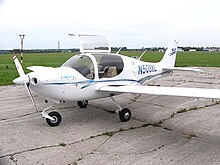| O-240 | |
|---|---|

| |
| Continental IO-240B | |
| Type | Piston aero-engine |
| National origin | United States |
| Manufacturer | Teledyne Continental Motors |
| First run | 1971 |
| Major applications | Issoire APM 40 Simba Diamond DA20-C1 AESL Airtourer Liberty XL2 |
| Produced | 1971-Today, 1993-Today (IO) |
| Developed from | Continental O-360 |
The Continental O-240 engine is a four-cylinder, horizontally opposed, air-cooled aircraft engine that was developed in the late 1960s for use in light aircraft by Continental Motors, Inc. The first O-240 was certified on 7 July 1971.
Design and development
The 130 hp (97 kW) O-240 was a new engine design derived from the six-cylinder Continental O-360 and introduced in 1971. It is generally similar in overall dimensions to the Continental O-200, but with a higher 8.5:1 compression ratio, designed to run on 100/130 avgas. The O-240 delivers 30% more power than the O-200 while it weighs only 12% more. It may be mounted in tractor or pusher configuration.
The O-240 was produced under license in the United Kingdom by Rolls-Royce Limited and was used to power the Reims-Cessna FRA150 Aerobat, a more powerful aerobatic model of the Cessna 150 constructed in France by Reims Aviation under license. Rolls-Royce acquired the rights to the O-240, but not the IO-240 in 1977.
The fuel-injected IO-240-A and -B were introduced in 1993. The A and B versions differ only in the type of fuel injector used.
The IOF-240 is similar to the IO-240-B except that it employs an Aerosance FADEC system to control the ignition and fuel injection systems. The engine was not selected to power any production North American-manufactured aircraft until the Liberty XL2 entered production in 2006 powered by the IOF-240-B.
Variants
- O-240-A
- Dual ignition, 130 hp (97 kW) at 2800 rpm, dry weight 246 lb (112 kg) including starter and generator. Uses a Marvel-Schebler MA-3SPA IO 5067 carburetor. Certified 7 July 1971
- IO-240-A
- Dual ignition, 125 hp (93 kW) at 2800 rpm, dry weight 246 lb (112 kg), uses a TCM 639231A27 fuel injector
- IO-240-B
- Dual ignition, 125 hp (93 kW) at 2800 rpm, dry weight 246 lb (112 kg), uses a TCM 639231A34 fuel injector
- IOF-240-B
- Aerosance FADEC system controls the ignition and fuel injection systems, 125 hp (93 kW) at 2800 rpm, dry weight 255 lb (116 kg)
Applications

- O-240
- AESL Airtourer T3
- Reims Cessna FRA150 Aerobat ("R" meaning a Rolls-Royce-built O-240)
- Rutan Voyager (front engine)
- Practavia Sprite
- Rollason Condor (D62C)
- St Croix Pietenpol Aerial
- Tri-R KIS TR-1
- Warner Revolution II
- IO-240
- IOF-240-B
Specifications (IOF-240-B)
Data from TYPE CERTIFICATE DATA SHEET NO. E7SO
General characteristics
- Type: "4-cylinder, air-cooled, naturally aspirated, horizontally opposed, fuel-injected, spark ignition, four-stroke, direct drive. The engine incorporates a full authority digital electronic control (FADEC) system to control the ignition and fuel injection functions."
- Bore: 4.438 in (112.7 mm)
- Stroke: 3.875 in (98.4 mm)
- Displacement: 240 in (3.93 L)
- Dry weight: 255 lb (116 kg)
Components
- Valvetrain: One intake and one exhaust valve per cylinder
- Fuel system: Aerosance FADEC system
- Fuel type: 100LL avgas
- Cooling system: Air-cooled
Performance
- Power output: 125 hp (93 kW) at 2,800 rpm
- Specific power: 0.52 hp/in (23.66 kW/L)
- Compression ratio: 8.5:1
- Power-to-weight ratio: 0.49 hp/lb (0.80 kW/kg)
See also
References
Notes
- ^ Federal Aviation Administration (March 2007). "TYPE CERTIFICATE DATA SHEET NO. E7SO Revision 4" (PDF). Archived from the original (PDF) on 2016-01-31. Retrieved 2008-12-18.
- ^ Federal Aviation Administration (March 2007). "TYPE CERTIFICATE DATA SHEET NO. E11EU Revision 4" (PDF). Retrieved 2008-12-27.
- ^ Christy, Joe: Engines for Homebuilt Aircraft & Ultralights, pages 58-59. TAB Books, 1983. ISBN 0-8306-2347-7
- ^ Shanaberger, Kenneth (2008). "Continental O-240". Archived from the original on 2008-10-10. Retrieved 2008-12-18.
- Gunston 1989, p.42.
Bibliography
- Gunston, Bill. World Encyclopedia of Aero Engines. Cambridge, England. Patrick Stephens Limited, 1989. ISBN 1-85260-163-9